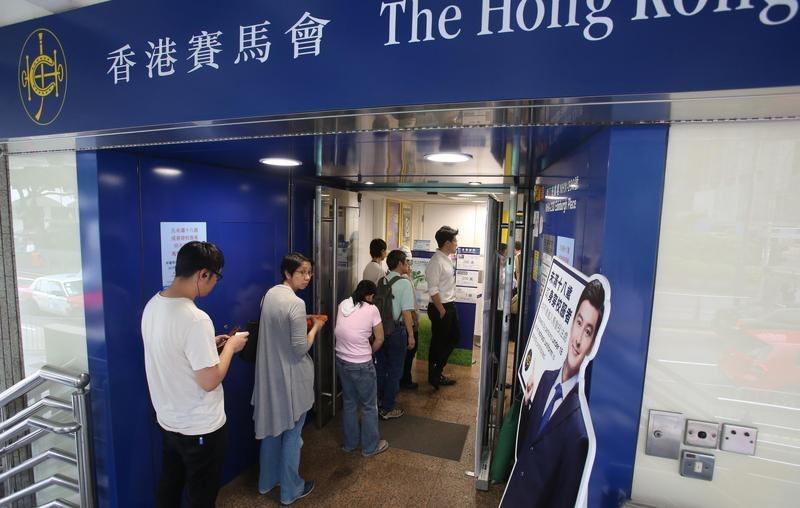
People wait in line to buy Mark Six Lottery at a Off-course Betting Branch of Hong Kong Jockey Club in Central, Hong Kong. (Photo: China Daily)
The Hong Kong Jockey Club will continue to give back to society amid the pandemic-stricken economy, its executive director of charities and community said.
In an exclusive interview with China Daily, Leong Cheung said that the club has spent millions of Hong Kong dollars out of its own coffers on relief funds and community projects to help the underprivileged, the elderly, and students.
The most notable project is the HK$100 million ($12.9 million) COVID-19 Emergency Relief Fund, for non-government organizations in the city. The fund offers direct assistance to the needy in local communities. The maximum amount each NGO can receive is HK$500,000.
Cheung said that the Jockey Club has pledged not to lay off any full-time employees as a result of COVID-19. Instead, it has launched a 50 percent income subsidy plan to assist its nearly 10,000 part-time employees, most of whom have not reported to work because of the reduced manpower requirements during the pandemic.
The Jockey Club is eligible to apply for the government-funded employee wage subsidy program, but it has not done so, using its own financial resources to support its employees.
"Despite shrinking revenues and expenditures for COVID-19 relief measures, we will not reduce charity donations pledged for the current financial year to show our commitment and social responsibility when Hong Kong faces a difficult period, but we will definitely pay less tax to the government," he said.
"The funding approval for a proposal by the HKJC Board of Stewards normally takes four to six months. But for this Emergency Relief Fund, it took us 10 to 14 days to set up the fund, invite applications from the NGOs and release the grant. About 200 NGOs have benefited from this initiative.
"Funding from the government has to go through more procedures and it has to be very cautious because it uses taxpayers' money. We are quicker and more flexible," he said.
The Jockey Club has suffered a huge loss of revenue because of the pandemic. Although horse racing goes on as usual, the racecourses and the off-course betting centers are closed to prevent crowds from gathering, but bettors can wager via tele-betting and online betting.
Because bettors can't visit the racecourses on racing days, food-and-beverage and souvenir sales have declined, with the exception of pre-booked dining services for club members and horse owners. As a result, less manpower is required on race days, leaving many part-time employees without work — and without pay.
Soccer betting revenue was almost zero when the five major European soccer leagues were suspended in March, with Germany's Bundesliga not returning until May 16, but the games were played in empty stadiums without spectators. The Mark Six lotteries are also canceled to prevent crowds at the off-course betting branches.
"Horse racing is our biggest revenue source, and that's why we have not stopped it. Fortunately, the betting turnover remains steady at about HK$1 billion per racing day over the past four months. I guess it is because when people stay at home, they bet via telephone or internet while watching the televised races as entertainment," Cheung said.
"We are very lucky that our jockeys, horse trainers and racing staff are not infected, while the horses are also healthy, so that racing can continue as usual. There is no easy way, other than the hard work of all concerned staff at the HKJC."
In his view, Hong Kong has done very well fighting the coronavirus without major outbreaks. The social cost has not been high because Hong Kong is not locked down like many foreign cities, and the people can go virtually everywhere despite some social-distancing control measures.
Cheung hopes COVID-19 will subside so that the Jockey Club can reopen the racecourses and the off-course betting centers as soon as possible, but he said he has no way of knowing when. He said he believes the pandemic situation may go up and down, referring to the comments of health experts that until a vaccine is available, a second or third wave may emerge.


